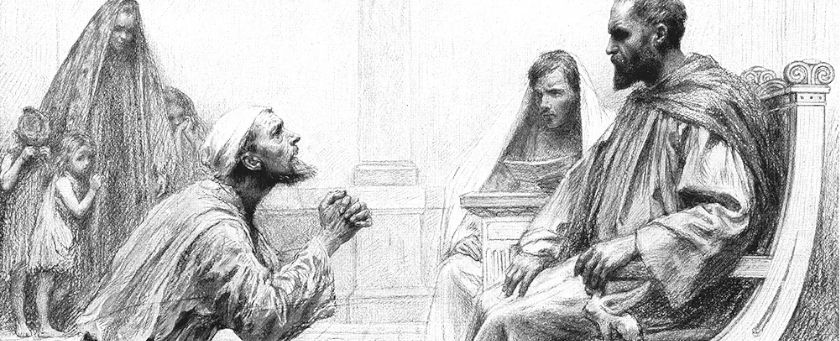The Parable of the Unmerciful Servant: Divine Justice
Twenty-Fourth Sunday of Ordinary Time, Year A

Readings:
Sir. 27:30-28:7; Ps. 103; Rm. 14:7-9; Matt. 18:21-35
The last few weeks, we have been focused on Matthew’s account of the formation of the disciples. Many scholars see chapters 14 through 18 of Matthew’s Gospel as a discourse on how disciples of Jesus ought to act, not only with respect to God, but towards one another. I have purposely been weaving little teachings on the Four Cardinal virtues into my homilies because these virtues are excellent tools for us to embrace not just a more fulfilling human life, but through the Theological Virtues, to more fully embrace the Christian life—the life of one who has been redeemed by Jesus Christ.
As we recall from the previous weeks Gospel passages, we learned how the disciples came to accept Jesus as the Christ in St. Peter’s great confession. Then we heard Jesus give his first Passion Prediction as St. Peter attempts to prevent him from going to Jerusalem. I explored Peter’s action as a lack of prudence, because he could not accept what he did not understand. Remember, prudence is right reason applied to practice. Jesus says, “You are thinking not as God does, but as human beings do.” In other words, Peter’s reason was clouded by his own idea of what it means to be the Christ. Then, we explored the importance of fortitude or courage in living the Christian life, but also in offering a correction to those who have gone astray. Remember, fortitude is strength to overcome the fear of danger or toil. Jesus gives us a formula for fraternal correction: If someone sins against us, we are to take them aside and tell them their fault, if they do not listen, bring witnesses, bring the Church, or ultimately shun them so that they may come to their senses and repent.
Today I would like to focus on the virtue of justice, which may be understood as the constant and permanent determination to give everyone his or her rightful due. Typically we look at justice as repayment for wrongdoing, but justice is not so much about punishment as it is about ensuring what is fair and right is equally applied to all. Therefore, whenever we, through our own actions, deprive someone of that which they are owed, we commit injustice.
The question in today’s Gospel is about forgiveness. St. Peter asks Jesus, “Lord, if my brother sins against me, how often must I forgive? As many as seven times?” Jesus’ response of seventy-seven times implies that no finite number can make forgiveness perfect, rather, there can be no limit to our willingness to forgive.
To drive this point home, Jesus tells his disciples the Parable of the Unmerciful Servant. The parable illustrates two different perspectives of justice. First, the King’s exercise of justice in the form of mercy, and second, the servant’s exercise of justice to his fellow servant. Now, the first servant was forgiven his entire debt by the King. But, rather then extend the same mercy that was extended to him by the King, the wicked servant instead has his fellow servant thrown in prison. Now, on one hand, some would say this is justice because the servant could not repay the debt, therefore justice demands that he be thrown in prison. But, what about the debt that was forgiven the first servant by the King? It certainly would have been just for the King to have issued the same judgment, but instead, the King had compassion on him and forgave the entire debt. This is an example of Divine Justice vs. human justice. Remember what Jesus says to St. Peter, “You are thinking not as God does, but as human beings do.” It is not easy for us humans to understand Divine Justice because we are often clouded by our own understanding of justice. That is why the first servant had his fellow servant thrown in prison. In his mind, he had it coming. But, Jesus urges us to think not as human beings do, but rather, as God does. And the Parable of the Unmerciful Servant is an example of how God thinks. God is merciful. God is just. God forgives perfectly.
What about us? Are we thinking as human beings do, or are we striving to think as God does? Are we being merciful to one another? Do we have compassion on one another and seek to forgive one another? When someone sins against us, do we seek to reconcile with them or do we put them in prison on our block list? Unfriend! Might we be thinking as human beings do?
And so, as we gather together as one people, one community, brothers and sisters in Christ, sons and daughters of the Father, we are the mystical Body of Christ on earth. And just as a body cannot function without its organs, limbs, and most importantly its head, so too, do we form a vital part of Christ’s mystical Body. How we treat one another in the Church ought to be a reflection of the merciful justice of the King in today’s Gospel, for we all know that the King represents the Father, who is all good and deserving of all our love. Therefore, as we celebrate the Eucharist today, let us be mindful of the ways in which we are in need of God’s mercy, but also, while we are here on earth, let us strive to be merciful toward one another. Then we will not only be thinking more like God does, but exercising justice as God does, without limit, without conditions, seeking unity in a world fulled by division.
Given during the COVID-19 pandemic.





Share this post
Twitter
Facebook
Pinterest
Email